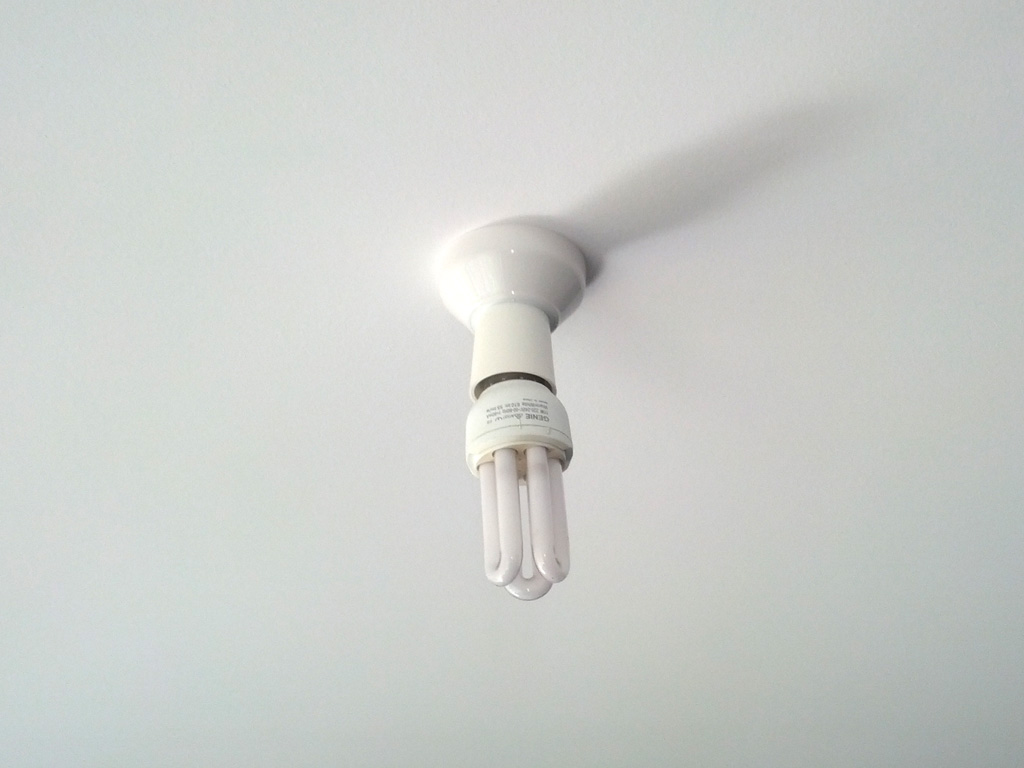I see it far too often and I just don’t get it. People will spend all DAY with their lights on! All DAY! Last time I checked the Sun shines during the day giving you zero reason to have any type of light on. Turn them off now, open your blinds and enjoy the natural sunlight and Vitamin D (assuming the window is open too).
Secondly they keep their lights on during the night even when they’re not in the room! For a long time I was under the impression that only children under the age of 5 needed to be told by their parents to “turn the lights off” but apparently everyone just goes about their business with them on everywhere. Got a light in your entrance area? Sure, leave it on 24/7 even though you’re in the living room!
I’ve even had professional building maintenance people tell me flat out that “leaving the lights on saves power because it takes up more power when you turn them on“. This is the biggest load of crap since people started sprouting the idea that glass is actually a highly viscous liquid! MythBusters busted the light taking up power when they turn on myth ages ago and feel free to get yourself educated about why glass is a solid here if you didn’t know already.
Through numerous tests, the MythBusters calculated that the power surge from turning on a light would only consume as much power as leaving it on for a fraction of a second (except for fluorescent tube lights; the start up consumed about 23 seconds’ worth of power). Furthermore, the wear and tear of turning the light on and off repeatedly did not reduce the bulb’s total life expectancy enough to offset the increased electricity usage. Therefore, it is far more economical to turn a light off rather than leaving it on.
Speaking of fluorescents, why people don’t have these in their house is FAR beyond my comprehension. Halogen lights consume about 6 times the amount of power than do fluorescents. When you take into account the “4 x 50W down lights per room vs. 1 x 7W CFL per room” situation that is in a lot of houses the calculations get even more absurd. Even being properly trained in the skill of “turning the damn lights off” I’d say we have about 3-4 CFL’s on for around 4 hours tops a day (assuming we’re in the house). That’s 7W * 4 = 28W per hour. Or 0.112kWh’s over the 4 hour period. Contrast that to the likely 50W * (4*4) = 800W per hour or 3.2kWh’s over the same 4 hour period. That’s (at our power rate) $0.992 vs $0.035 each day or $362.08 vs $12.67 each year. Then there’s the cost of replacing the halogens which blow out much quicker than the CFL’s… Then there’s the cost to the environment too. Why you’d waste $350+ every year for no reason is beyond me. They even have CFL down lights now so there’s REALLY no excuse for you to not have them installed but I digress…
Finally I’d like to also make a shout out to anyone that owns or controls the lighting in a business.
TURN THE DAMN LIGHTS OFF!
It seems that EVERY business insists on leaving either all or most of their lights on 24/7. I see skyscrapers with 20 floors of empty workspace and thousands of high powered fluorescent lights on ALL day and ALL night even with the buildings completely empty. This to me is just stupidity on an epic proportion. It’s akin to having a fire hydrant hanging out of every window running at full pelt all day/night spewing water everywhere but for some reason everyone walks by as if there’s no issue! All the way down to tiny bakeries or clothing stores that have again, most or all of their lights on. Why!? So you can advertise your merchandise to the people that don’t walk by because it’s 4am in the morning? To stop “thieves”? I’m pretty sure thieves can turn lights off you know. There is ZERO reason your lights should be on so do us ALL a favour (we have to live on this planet too) as well as your wallet and turn them off please.
*climbs off soapbox*
The benefits include: 1) How to pay off your mortgage faster than 99% of people with one hour a month of work 2) How to get rid of your debt and have the freedom to spend money on the things you love, guilt free 3) Clear outline of how to setup your expenses, mortgage and general finance 4) How offset accounts work and how to get the same result without being gouged by the big banks 5) How to cut through the crap and focus on the things that truly matter when taking down a mortgage 6) How to adjust the strategy so it works for you, even if you have kids, even if you only have one income 7) How to do all of these things and maintain a normal social life (and never be cheap).


